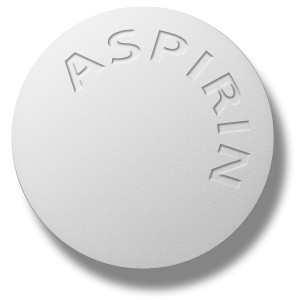 Some recent studies looked at aspirin use and cancer and found that consistent use for a number of years (5 to 10 years) lowers the rate of a number of cancers, including colon cancer. However, the longer one takes daily aspirin - then harms start adding up, with a major one being gastrointestinal bleeding. NSAIDs (non-steroidal anti-inflammatory drugs) are also linked to lower rates of various cancers, but harms with long-term use are cardiovascular risks (stroke and heart attack). The first article discusses that many doctors think this lower cancer rate occurs because aspirin and NSAIDs lower inflammation, and as we know, inflammation is linked to cancer.
Some recent studies looked at aspirin use and cancer and found that consistent use for a number of years (5 to 10 years) lowers the rate of a number of cancers, including colon cancer. However, the longer one takes daily aspirin - then harms start adding up, with a major one being gastrointestinal bleeding. NSAIDs (non-steroidal anti-inflammatory drugs) are also linked to lower rates of various cancers, but harms with long-term use are cardiovascular risks (stroke and heart attack). The first article discusses that many doctors think this lower cancer rate occurs because aspirin and NSAIDs lower inflammation, and as we know, inflammation is linked to cancer.
From Science News: Aspirin reverses obesity cancer risk
Research has shown that a regular dose of aspirin reduces the long-term risk of cancer in those who are overweight in an international study of people with a family history of the disease....They found that being overweight more than doubles the risk of bowel cancer in people with Lynch Syndrome, an inherited genetic disorder which affects genes responsible for detecting and repairing damage in the DNA. Around half of these people develop cancer, mainly in the bowel and womb. However, over the course of a ten year study they found this risk could be counteracted by taking a regular dose of aspirin.
Lots of people struggle with their weight and this suggests the extra cancer risk can be cancelled by taking an aspirin.This research adds to the growing body of evidence which links an increased inflammatory process to an increased risk of cancer. Obesity increases the inflammatory response. One explanation for our findings is that the aspirin may be suppressing that inflammation which opens up new avenues of research into the cause of cancer."
When they were followed up ten years later, 55 had developed bowel cancers and those who were obese were more than twice as likely to develop this cancer -- in fact 2.75 times as likely. Following up on patients who were taking two aspirins a day revealed that their risk was the same whether they were obese or not....What is surprising is that even in people with a genetic predisposition for cancer, obesity is also a driver of the disease.
The researchers believe the study shows that aspirin is affecting an underlying mechanism which pre-disposes someone to cancer and further study is needed in this area. Since the benefits are occurring before the very early stages of developing a tumour -- known as the adenoma carcinoma sequence -- the effect must be changing the cells which are predisposed to become cancerous in later years.

 Artificial trans fats in foods are bad for health in so many ways: linked to increased risk of coronary heart disease, atherosclerosis, inflammation, and risk of early death. And even though the FDA is finally phasing out partially hydrogenated oils (because they have high levels of
Artificial trans fats in foods are bad for health in so many ways: linked to increased risk of coronary heart disease, atherosclerosis, inflammation, and risk of early death. And even though the FDA is finally phasing out partially hydrogenated oils (because they have high levels of  Trans fats are commonly used in processed foods to improve taste, texture, and shelf life. Artificial trans fats are found in partially hydrogenated oils and in other ingredients, such as refined oils, emulsifiers, flavors and colors. Even those processed foods that say zero trans fats may contain trans fats - due to a loophole in labeling laws (if it has less than .5 grams per serving, then it can be rounded down to zero - thus allowing the incorrect claim of zero trans fats). Eating a variety of processed foods, each containing a little trans fats, easily adds up to eating a significant amount daily.Trans fats in the diet have long been linked to cardiovascular disease, artherosclerosis, obesity, oxidative stress, and inflammation, but now research finds that it is linked to a poorer memory in middle-aged men under the age of 45. From Science Daily:
Trans fats are commonly used in processed foods to improve taste, texture, and shelf life. Artificial trans fats are found in partially hydrogenated oils and in other ingredients, such as refined oils, emulsifiers, flavors and colors. Even those processed foods that say zero trans fats may contain trans fats - due to a loophole in labeling laws (if it has less than .5 grams per serving, then it can be rounded down to zero - thus allowing the incorrect claim of zero trans fats). Eating a variety of processed foods, each containing a little trans fats, easily adds up to eating a significant amount daily.Trans fats in the diet have long been linked to cardiovascular disease, artherosclerosis, obesity, oxidative stress, and inflammation, but now research finds that it is linked to a poorer memory in middle-aged men under the age of 45. From Science Daily: Once again, research shows that eating lots of fruits and vegetables is beneficial to health - this time because high vitamin C concentrations in the blood is linked to lower risks of developing cardiovascular disease and early death. And it's food that they looked at, not supplements. From Science Daily:
Once again, research shows that eating lots of fruits and vegetables is beneficial to health - this time because high vitamin C concentrations in the blood is linked to lower risks of developing cardiovascular disease and early death. And it's food that they looked at, not supplements. From Science Daily:
 New research finding health benefits to humans from a four day low calorie diet - the Fasting Mimic Diet (FMD). Cutting calories to 34 to 54% of normal for a few days is obviously much easier to do than actual fastiing, so these results look very promising. In summary: the researchers found that in a small human trial, three cycles of this diet given to 19 subjects once a month for five days decreased risk factors and biomarkers for aging, diabetes, cardiovascular disease and cancer (and with no major adverse side effects). Three earlier posts on various types of minifasting health benefits:
New research finding health benefits to humans from a four day low calorie diet - the Fasting Mimic Diet (FMD). Cutting calories to 34 to 54% of normal for a few days is obviously much easier to do than actual fastiing, so these results look very promising. In summary: the researchers found that in a small human trial, three cycles of this diet given to 19 subjects once a month for five days decreased risk factors and biomarkers for aging, diabetes, cardiovascular disease and cancer (and with no major adverse side effects). Three earlier posts on various types of minifasting health benefits:  This latest study confirms the benefits of eating peanuts and nuts. The Netherlands Cohort Study has studied 120, 000 Dutch men and women since 1986, and they found that eating approximately 1/2 handful of peanut or nuts per day is linked to a lower risk of mortality. However, this beneficial effect did not apply to peanut butter, and they theorize that it may be due to the added ingredients in it (salt and vegetable oils that are
This latest study confirms the benefits of eating peanuts and nuts. The Netherlands Cohort Study has studied 120, 000 Dutch men and women since 1986, and they found that eating approximately 1/2 handful of peanut or nuts per day is linked to a lower risk of mortality. However, this beneficial effect did not apply to peanut butter, and they theorize that it may be due to the added ingredients in it (salt and vegetable oils that are